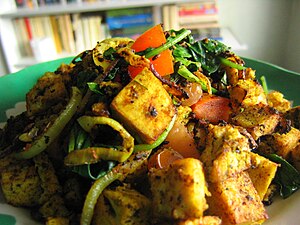 Image via WikipediaIf you recently started reading about vegetarian diets, you have probably read all sorts of strange vegetarian terms and categories like "vegan," "ovo-lacto vegetarian," and "semi-vegetarian." You probably wondered what the big deal was. Afterall, what is so conceptually tough about not eating meat? Is it really that complicated?
Image via WikipediaIf you recently started reading about vegetarian diets, you have probably read all sorts of strange vegetarian terms and categories like "vegan," "ovo-lacto vegetarian," and "semi-vegetarian." You probably wondered what the big deal was. Afterall, what is so conceptually tough about not eating meat? Is it really that complicated?And you were right!
The distinctions between these sub-categories of vegetarian are actually small, but each is very important to members who belong to the groups. For them, these distinctions aren’t arbitrary lines; they are important dietary or ethical decisions.
Let’s take a look at some of these groups:
VEGETARIAN:
Vegetarian is a blanket term used to describe a person who does not consume meat, poultry, fish, or seafood. This grouping includes vegans and the various sub-categories of vegetarian; however, it generally implies someone who has less dietary restrictions than a vegan.
SEMI-VEGETARIAN:
The term semi-vegetarian is usually used to describe someone who is not actually a vegetarian. Semi-vegetarian generally implies someone who only eats meat occasionally or doesn’t eat meat, but eats poultry and fish.
OVO-LACTO-VEGETARIAN:
Ovo-lacto vegetarians are vegetarians who do not consume meat, poultry, fish, and seafood, but do consume eggs and milk. This is the largest group of vegetarians.
OVO-VEGETARIAN:
Ovo-vegetarian is a term used to describe someone who would be a vegan if they did not consume eggs.
 Image via WikipediaLACTO-VEGETARIAN:
Image via WikipediaLACTO-VEGETARIAN:Lacto-vegetarian is a term used to describe someone who would be a vegan if they did not consume milk.
VEGAN:
Vegan is the strictest sub-category of vegetarians. Vegans do not consume any animal products or byproducts. Some even go as far as not consuming honey and yeast. Others do not wear any clothing made from animal products (leather, wool, or even silk).
Take some time to figure out what group you will belong to if you are considering becoming a vegetarian. You will want to consider both dietary and ethical reasons for choosing this lifestyle. And remember, as the picture above demonstrates nicely, you can still enjoy delicious meals without eating meat!
A Few Good Vegan & Vegetarian Cookbooks:

No comments:
Post a Comment
We welcome comments and suggestions!